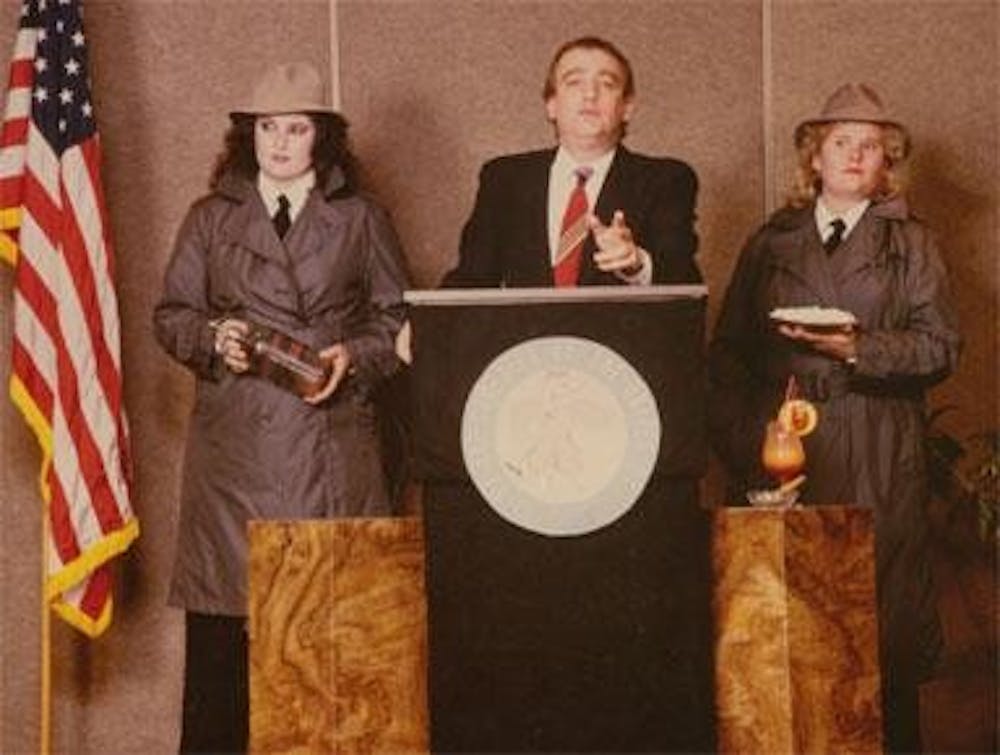“Comedy? If you wanna ask my honest opinion, comedy is headed straight
into the shitter. This whole Internet thing is a fad, and you can quote
me on that!”
Comedian James Adomian is joking, but he’s about to launch into a rant as though he were broadcasting across the Internet.
“As soon as the government finally pulls the plug on the Internet and
the economy tanks, we’re going to be left barking on street corners like
old-timey guys,” Adomian mused. “You wanna know the future of comedy?
It’s in Russian and Chinese. I’m a huge fan of the Russian comedy scene.
And my advice to upcoming comics: Learn fuckin’ Mandarin.”
As a comic, Adomian has found that the freedom of the
Internet has broadened not only what he’s capable of saying or doing,
but also the audience that will faithfully follow him.
It’s made for a thriving, personal, intimate and increasingly bizarre comedy scene that would not
have survived when Jerry Seinfeld was making observations on Johnny
Carson.
“You get to do your own thing when you’re on the Internet.
There are no restrictions. You can say something offensive on the
Internet and get the right people to find it,” Adomian said. “I’m able
to have people see me without seeing me.”
The beauty of the Internet’s place in comedy today is that anyone can
get to know a comedian online, said IU Communication and Culture
graduate student James Paasche.
“Now the Internet has broken down
barriers that you can become friends with comedians,” Paasche said. “We
have so many chances to engage with these people. Now, with websites and
Twitter, you have so much access, and it’s engendered this attitude that ‘I need to be on at all times.’”
One of the largest mediums comedians have found to reach a wide audience and identify with them personally is podcasting.
“Podcasts came along, and suddenly we’re all podcasters,” Adomian said.
Jared Thompson, owner of Bloomington’s the Comedy Attic, said he knows
this to be true of nearly every successful comedian today.
“We have no choice but to stay up on what’s happening in the podcast world,” Thompson said.
Thompson explained that some people came to see Adomian perform at the
Comedy Attic based solely on hearing his appearances on the popular
Comedy Bang Bang podcast. This has proved to be a great influence in
Adomian’s routine. “I’ve learned how to do comedy as much through the
Internet as I have through live performances,” Adomian said. “There is
an audience, even if they’re not right here. People get to see and hear
stuff they wouldn’t have seen or heard if they only got to see a TV
set.”
Paasche said he thinks podcasts and the Internet have created identities for comics that draw audiences like never before.
“Now that they can do these acts that aren’t based around
a set of jokes and they can interact with people who know their back
stories, know their histories, they probably like them more as people
than as comedians,” Paasche said. “It’s not just a shtick. It’s me
sitting down and bullshitting with you, and you feel like you’re getting
drunk with a buddy. But it’s not. It’s a professional.”
Paasche is describing the certain “it” factor Thompson said he searches for when hiring talent.
“They
either have it or they don’t,” Thompson said. “Sometimes it’s like a
relationship. It just depends on how compatible you are. There’s an ‘it’
about people we try to bring here.”
But with podcasts and Twitter becoming a standard for comedians,
Thompson argued the industry has become that much more competitive. It’s
crucial that comics find ways to stand out however they can.
“For
me to book you, you have to be eager to get new credits. You have to be
involved in something other than stand-up comedy,” Thompson said. “Are
you doing something different from what everyone else is doing? They’re
consistently trying to be more famous.”
What this has fostered is consistently odd approaches to get a laugh, and this is now the rule rather than the exception.
“Alternative
comedy is certainly not alternative anymore. There’s a thriving scene
outside of the established clubs from the ’80s,” Adomian said.
Starting with Will Ferrell early in the 2000s, Thompson said there was a
dominant thought that “Being bizarre was just considered funny.”
“It
started a trend of people in their 20s who are just looking to laugh at
something that isn’t obvious,” Thompson said. “We are looking at the
first time that the acceptable comedians that people are drawn from are
weird.”
Some of the comedians generating the most buzz today are consciously
aware of this departure from being traditional and a need to establish a
niche.
“When you’re dealing with comedians like Hannibal Burress and Marc Maron, who are on the cutting edge of comedy right now, they’re not
necessarily going to connect with a general audience,” Thompson said.
“They’re going to touch on things that someone who just wants to see
stand-up comedy isn’t prepared for, some things that are on the cutting
edge of comedy.”
So where does this leave comedy? Will stand-up forever be selective, odd and personal? Thompson doesn’t think so.
“Somebody
will come along and go back to being a straight comic, and that’ll be
considered throwback,” Thompson said. “It’s going to be an evolving
world yes, but I guarantee you in five years you’ll see someone that
gets up there and just tells jokes, and they’ll be like, ‘Wow, this is
like seeing Seinfeld in the early ’80s.’”
But Thompson is the first to admit being different isn’t a bad thing.
“In having to be different from someone, that’s only going to broaden what’s considered funny.”
Maybe comedy isn’t headed straight for the shitter after all.
The State of Comedy

Get stories like this in your inbox
Subscribe





